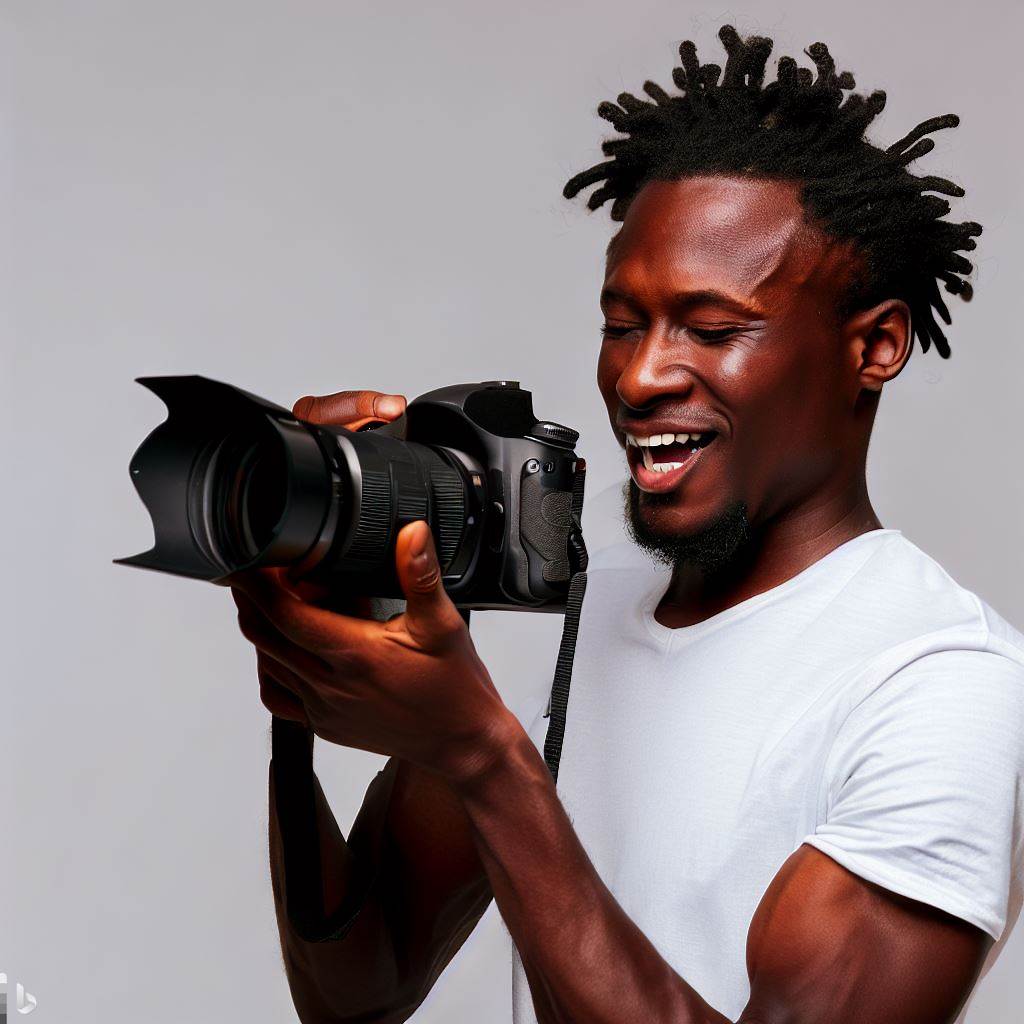Introduction
A. Production Design in Nollywood
- The role of a production designer in Nigeria’s thriving film industry, Nollywood, is pivotal.
- They transform mere locations into captivating, immersive film sets.
B. Crafting Visual Magic
- Production design is the creative backbone, conjuring up cinematic worlds that captivate audiences.
- It breathes life into scripts, crafting visual spectacles that engage and transport viewers.
C. Rising Demand
- Nigeria’s film industry is booming, and so is the demand for skilled production designers.
- As Nollywood gains international recognition, production designers are increasingly sought after for their magic touch.
Understanding the Role of a Production Designer
A. Responsibilities and scope of work of a production designer
A production designer in Nigeria is a crucial role in the filmmaking industry, responsible for creating the visual aesthetic and overall look of a film or television production.
They are essentially the architects of the on-screen world, working closely with the director and other key crew members to bring the script to life.
The responsibilities of a production designer include:
- Conceptualizing the visual style: The production designer works closely with the director to understand their vision and create a visual concept that aligns with the story and characters.
- Creating sets and locations: They are responsible for designing and constructing sets that reflect the time period, location, and atmosphere of the story. This involves researching, scouting suitable locations, and overseeing the construction process.
- Art direction: The production designer oversees the artistic aspects of the production, ensuring that the overall look is cohesive and visually appealing. They work closely with the art department, set decorators, and prop masters to ensure consistency in the aesthetic.
- Collaboration with other departments: The production designer works closely with various departments such as cinematography, costume design, and visual effects to ensure a seamless integration of all visual elements.
B. Essential skills and qualifications required to become a production designer
To become a successful production designer in Nigeria, one must possess a combination of technical skills, creative abilities, and qualifications.
Some essential skills and qualifications include:
- Strong design skills: A production designer must have a keen eye for aesthetics and be able to create visually appealing designs that enhance the storytelling.
- Proficiency in design software: Proficiency in software such as AutoCAD, SketchUp, and Adobe Creative Suite is necessary to create detailed designs and presentations.
- Knowledge of film production process: Understanding the various stages of film production, from pre-production to post-production, is essential for a production designer to effectively collaborate with the rest of the crew.
- Attention to detail: The ability to pay meticulous attention to details is crucial in ensuring that the production design aligns with the director’s vision and the script.
- Strong communication and collaboration skills: A production designer must effectively communicate their ideas and collaborate with other team members to bring the vision to life.
- Formal education or training: While not a strict requirement, a Bachelor’s degree in production design, theater design, or a related field can provide a solid foundation of knowledge and skills.
- Portfolio: Building a strong portfolio showcasing previous work is essential to demonstrate proficiency and creativity in production design.
Basically, becoming a production designer in Nigeria requires a combination of technical skills, creative abilities, and qualifications.
The production designer plays a vital role in creating the visual world of a film or television production, collaborating closely with the director and other key crew members.
With the right skills and qualifications, aspiring production designers can embark on an exciting career in the Nigerian film industry.
Read: Networking for Production Designers in Nigeria
Obtaining Relevant Education and Training
In order to start a career as a production designer in Nigeria, obtaining relevant education and training is crucial.
By exploring the various educational paths and courses available for aspiring production designers, individuals can lay a solid foundation for their future career.
A. Various Educational Paths and Courses Available
Aspiring production designers should research different educational paths that can lead them towards a successful career in the industry.
This may include pursuing a degree in film and media studies, visual arts, or set design.
Additionally, aspiring production designers should consider taking courses specifically tailored to their desired career path, such as production design, art direction, and set decoration.
These courses will provide them with the necessary technical and creative skills required for the job.
B. Join Film Schools or Specialized Design Institutes
One of the most effective ways to gain a comprehensive education and training in production design is by enrolling in film schools or specialized design institutes.
These institutions offer specific programs and courses that focus on different aspects of production design.
Attending film schools or design institutes provides aspiring production designers with the opportunity to learn from experienced professionals in the field.
They will be exposed to practical and theoretical knowledge that will help them excel in their future careers.
C. Benefit from Internships, Workshops, and Hands-On Experience
Internships, workshops, and hands-on experience are invaluable when it comes to developing necessary skills as a production designer.
By actively participating in these opportunities, individuals can gain practical experience and build a strong portfolio.
Internships allow aspiring production designers to work alongside industry professionals and learn from their expertise.
They can observe and assist in real production settings, understanding the intricacies of the job firsthand.
Workshops provide a platform for production designers to learn new techniques, stay updated with industry trends, and network with fellow professionals.
Attending workshops can expand their knowledge and provide exposure to different perspectives within the field.
Hands-on experience is crucial for honing practical skills.
By volunteering or assisting in various production projects, individuals can gain practical knowledge of set design, prop creation, art direction, and other aspects of production design.
Generally, obtaining relevant education and training is a vital step in starting a career as a production designer in Nigeria.
By exploring different educational paths, joining film schools or specialized design institutes, and seeking opportunities for internships, workshops, and hands-on experience, aspiring production designers can acquire the necessary skills and knowledge for success in the industry.
Read: Apprenticeships in Production Design in Nigeria
Building a Portfolio
A. Significance of a portfolio in showcasing an individual’s creative and technical abilities
A portfolio is a powerful tool for production designers as it allows them to showcase their creative and technical abilities.
It serves as a visual representation of their skills and expertise, giving potential employers a glimpse into their talent and style.
By including a variety of different works, such as sketches, photographs, mood boards, and previous projects, an individual can demonstrate their versatility and range as a production designer.
This helps generate interest and confidence in their abilities among industry professionals.
A well-curated portfolio also allows production designers to stand out from the competition.
It helps them create a strong personal brand and make a lasting impression on potential employers or clients.
It serves as a platform for them to express their unique vision and storytelling skills.
B. Tips on how to curate a compelling portfolio, including photographs, sketches, mood boards, and previous projects
When curating a portfolio, it is essential to select pieces that showcase the breadth and depth of your skills.
Here are some tips to help you create a compelling portfolio:
- Include a variety of photographs that demonstrate your ability to create and capture different visual styles and moods.
- Showcase your sketching skills by including sketches or concept art that highlight your creativity and attention to detail.
- Create mood boards that depict the aesthetics and atmosphere you can bring to a project.
- Include previous projects that highlight your experience and successful collaborations with other members of the production team.
- Organize your portfolio in a visually appealing and easy-to-navigate manner.
- Keep your portfolio updated with your latest work to showcase continuous growth and improvement.
C. Importance of tailoring the portfolio to the Nigerian film industry
When building a portfolio as a production designer in Nigeria, it is crucial to understand the unique needs and expectations of the Nigerian film industry.
Tailoring your portfolio to this specific market can significantly increase your chances of success.
Research and familiarize yourself with the current trends and preferences in Nigerian filmmaking.
Pay attention to the styles, aesthetics, and cultural elements that resonate with Nigerian audiences.
Incorporate these influences into your portfolio to showcase your understanding and ability to cater to the local market.
Additionally, consider including projects that reflect Nigeria’s diverse cultural heritage and showcase your ability to create authentic and visually stunning designs that resonate with local audiences.
This demonstrates your commitment to telling Nigerian stories and adds credibility to your portfolio.
Furthermore, networking and seeking feedback from industry professionals in Nigeria can help you fine-tune your portfolio to meet the specific expectations and preferences of the local film industry.
Their insights and guidance can play a vital role in making your portfolio stand out and increase your chances of obtaining opportunities in Nigeria.
Essentially, a well-curated portfolio is an essential tool for production designers in Nigeria.
It showcases their creative and technical abilities, helps them stand out from the competition, and communicates their unique vision and storytelling skills.
By tailoring their portfolio to the Nigerian film industry, production designers can increase their chances of success and demonstrate their understanding of local preferences and cultural nuances.
Read: Tools Every Production Designer Needs in Nigeria
Networking and Industry Connections
A. Importance of Networking in the Nigerian Film Industry
- Networking is crucial for aspiring production designers in Nigeria to create industry connections.
- Building a strong network helps in gaining exposure, enhancing professional growth, and accessing new opportunities.
- Through networking, one can establish relationships with filmmakers, directors, and other industry professionals.
- These connections can lead to partnerships, collaborations, and referrals for future projects.
- The Nigerian film industry thrives on collaboration and networking, making it essential for a production designer to connect with the right people.
B. Joining Industry Events, Film Festivals, and Workshops
- Attending industry events, such as film festivals and workshops, provides tremendous networking opportunities.
- These events bring together like-minded professionals, including directors, producers, and fellow production designers.
- Networking at film festivals allows one to showcase their talent, gain exposure, and meet potential collaborators.
- Workshops and seminars offer an environment to learn from industry experts and connect with fellow creatives.
- By actively participating in these events, production designers can expand their network and increase their visibility in the industry.
C. Joining Relevant Associations or Guilds
- Joining associations or guilds specific to the film industry in Nigeria is highly beneficial for networking purposes.
- Associations like the Directors Guild of Nigeria or the Association of Nollywood Core Producers facilitate connections.
- These organizations provide opportunities to meet industry insiders, including directors, producers, and experienced production designers.
- Being a part of a professional association or guild gives credibility and access to a wider network of professionals.
- Networking within these groups can lead to collaborations, mentorship opportunities, and a better understanding of the industry.
Networking plays a crucial role in the career path of a production designer in Nigeria’s film industry.
By actively participating in industry events, film festivals, and workshops, designers can meet and connect with like-minded professionals.
Joining relevant associations or guilds opens doors to meet industry insiders, gain credibility, and access a wider network.
Building strong industry connections through networking creates opportunities for growth, collaborations, and professional success.
Embracing networking as an essential tool will enhance the journey of a production designer starting out in Nigeria’s film industry.
Gaining Practical Experience
A. Benefits of gaining practical experience on film sets
Gaining practical experience is crucial for aspiring production designers in Nigeria.
By immersing yourself on film sets, you can gain valuable insights into the production design process and develop the necessary skills to excel in the industry.
Firstly, practical experience provides a deep understanding of the production design process.
It allows you to witness firsthand how a script is translated into visual elements and how the art department collaborates with other departments to bring a creative vision to life.
Additionally, gaining hands-on experience with the equipment and tools used in film production is invaluable.
By working on film sets, you will become familiar with various tools, materials, and techniques used in production design, enhancing your technical skills.
Moreover, practical experience allows you to build a portfolio showcasing your work and skills.
By actively participating in film projects, you can document your contributions and create a strong portfolio that demonstrates your abilities to potential employers.
B. How to start as a production assistant or art department intern
To start gaining practical experience, consider starting as a production assistant or art department intern.
Reach out to local production companies, film schools, or independent filmmakers for internship opportunities.
Volunteering for independent film projects is also a great way to gain practical experience and get involved in the filmmaking community.
Attending industry events and networking with professionals in the film industry is another effective way to start as a production designer.
Building relationships with industry professionals can lead to valuable connections and future job opportunities.
C. Importance of learning from experienced production designers and industry professionals
In addition to practical experience, learning from experienced production designers and industry professionals is crucial in your development as a production designer.
Seeking mentorship from established designers and attending workshops or conferences can provide valuable insights and guidance.
Shadowing experienced production designers is also an excellent way to learn their techniques and gain practical knowledge.
By observing their workflow and approaches, you can expand your skills and adapt successful methods to your own work.
Finally, actively collaborating with other departments on film sets is essential.
Understanding the roles and responsibilities of each team member will enable you to effectively communicate and collaborate with other departments, ensuring a seamless production process.
In essence, gaining practical experience as a production designer in Nigeria is vital for success in the industry.
By immersing yourself in film sets, starting as a production assistant or intern, and learning from experienced professionals, you can develop the skills, knowledge, and connections necessary to excel in this dynamic field.
Read: Freelancing as a Production Designer in Nigeria’s Scene

Showcasing Creativity and Flexibility
A. The need for creativity and adaptability in the ever-evolving Nigerian film industry
In order to succeed as a production designer in Nigeria, one must possess a high level of creativity and flexibility.
The Nigerian film industry is known for its fast-paced nature and ever-changing demands.
As a production designer, you will be tasked with creating visually striking and immersive sets that bring the director’s vision to life.
However, creativity in the Nigerian film industry goes beyond just creating visually appealing sets. It also involves thinking outside the box and pushing boundaries.
Nigerian filmmakers are constantly seeking new and innovative ways to captivate their audiences, and production designers play a crucial role in achieving this.
B. Examples of how production designers can push boundaries and think outside the box
Production designers have the power to transform ordinary locations into extraordinary settings through their artistic skills.
For example, if a scene requires a dilapidated house, a production designer may need to get creative and find ways to make an existing location look run-down and abandoned.
Furthermore, production designers can push boundaries by incorporating unconventional materials and techniques into their designs.
Publish Your Professional Profile, Business or Brand
Showcase your expertise, gain trust, and boost visibility instantly on Professions.ng.
Publish NowInstead of relying solely on conventional props, they can experiment with unique materials and repurpose everyday objects to create visually striking and memorable sets.
C. Encourage aspiring production designers to constantly experiment and challenge themselves creatively
If you aim to start a career as a production designer in Nigeria, it is important to constantly experiment and challenge yourself creatively.
Take inspiration from various sources such as art, literature, and architecture to broaden your creative horizons.
Attend workshops and networking events to connect with other creative professionals and gain exposure to different perspectives and approaches.
Collaborate with directors, cinematographers, and art directors to enhance your understanding of the storytelling process and how production design can amplify the narrative.
Moreover, be open to taking risks and stepping outside your comfort zone.
The Nigerian film industry is always evolving, and as a production designer, you must adapt to new trends and technologies.
Embrace the opportunity to work on diverse projects that allow you to explore different genres and styles, as this will expand your creative repertoire.
In short, a successful production designer in Nigeria requires a combination of creativity, adaptability, and a willingness to push boundaries.
By constantly challenging yourself creatively and seeking out new experiences, you can establish yourself as a sought-after production designer in the ever-evolving Nigerian film industry.
See Related Content: The Role of Costume Designers in Nigeria’s Nollywood
Finding Job Opportunities
A. Various platforms and resources for finding production designer job openings in Nigeria
- Check online job portals such as Indeed, Naukri, and LinkedIn for production designer vacancies.
- Join relevant social media groups and forums where job opportunities are frequently shared.
- Attend industry events, film festivals, and conferences to network with professionals and learn about job openings.
- Subscribe to newsletters and mailing lists of production companies or organizations related to the film industry.
B. Recommend building professional relationships with producers, directors, and fellow crew members
- Attend film industry networking events and workshops to connect with producers and directors.
- Collaborate on student or independent film projects to build a strong portfolio and network.
- Join professional organizations like the Association of Movie Producers (AMP) and the Directors Guild of Nigeria (DGN).
- Maintain a positive and professional attitude while collaborating with fellow crew members on film sets.
C. Potential of freelancing and collaborating with independent filmmakers or production companies
- Offer your services as a freelance production designer to independent filmmakers or production companies.
- Network with independent filmmakers through film festivals and screenings to showcase your skills and abilities.
- Create an online portfolio or website to showcase your previous work and attract potential clients.
- Collaborate with independent filmmakers on short films, music videos, or commercials to gain experience and exposure.
- Consider joining or starting a collective of freelance production designers to increase visibility and opportunities.
Finding job opportunities as a production designer in Nigeria requires a proactive approach and strategic networking.
By exploring various platforms and resources, building professional relationships, and embracing freelancing opportunities, you can enhance your chances of securing job openings and establishing a successful career in the Nigerian film industry.
Navigating Challenges and Overcoming Obstacles
A. Potential challenges that aspiring production designers may face in Nigeria
- Inadequate infrastructure and limited resources for production design projects.
- Lack of recognition and understanding of the role of production designers in the industry.
- Fierce competition within the industry, making it difficult to stand out.
- Financial constraints that may hinder the execution of ambitious design ideas.
- Inconsistent work opportunities and a scarcity of long-term projects.
B. Strategies and tips for overcoming these challenges
- Perseverance: Stay committed to your craft despite the challenges that come your way.
- Continuous learning: Keep improving your skills through workshops, courses, and self-study.
- Adaptability: Be flexible and open-minded to adjust to the limitations and resources available.
- Networking: Build a strong network within the industry to create opportunities and collaborations.
- Develop a unique style: Stand out by developing a distinctive design aesthetic that sets you apart.
- Seek mentorship: Find experienced professionals who can guide and support you on your journey.
- Take low-budget projects: Use these opportunities to showcase your creativity and resourcefulness.
- Create a portfolio: Showcase your best work to potential clients and employers.
- Stay updated: Keep track of industry trends and developments to stay relevant in the market.
- Build relationships with suppliers: Establish good relationships to negotiate better deals for resources.
Overcoming challenges as a production designer in Nigeria requires a combination of determination, adaptability, and continuous learning.
Despite the obstacles that aspiring professionals may face, a successful career in production design is possible.
By utilizing the strategies mentioned above and always pushing your creative boundaries, you can navigate the challenges and build a thriving career in Nigeria’s film and entertainment industry.
Conclusion
A. Key points discussed in the blog post
Starting as a production designer in Nigeria requires a strong passion for creativity and storytelling.
It is important to gain relevant education and experience, network with industry professionals, and continuously improve skills.
B. Closing statement for aspiring production designers in Nigeria
Aspiring production designers in Nigeria, embrace challenges and seize every opportunity to showcase your talent.
Be persistent, work hard, and never stop learning. Your unique vision and contributions can shape the future of Nigerian film and television industry.




